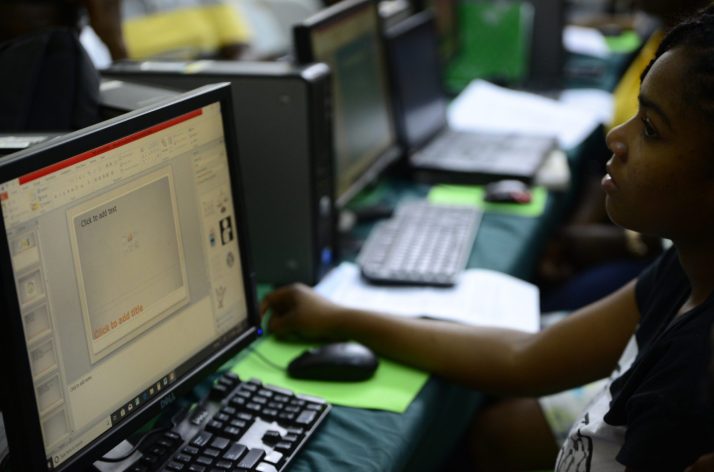Prime Minister, Brigadier (ret’d) Mark Phillips on Monday told members of the Caribbean Association of National Telecommunications Organisations (CANTO) that the government would be investing US$17.4M to improve the ICT capabilities of more than 200 communities in Guyana.
The Prime Minister, who delivered the feature address at the organisation’s Annual General Meeting (AGM) and Mini Exhibition, underscored the importance of technology in overhauling the traditional ways in which the Region has conducted business.
“Prior to 2020, the possibilities of Information and Communication Technologies for transforming our economies were already evident. Now, with the advent of the COVID-19 pandemic, there is a pressing imperative to ensure the widespread rollout and adoption of ICTs. Undisputedly, such technologies are instrumental to our ability to respond to the pandemic.”
He emphasised that ICTs are enabling remote access to work and school for citizens and have also forced the country to break through barriers that have previously prevented the delivery of more government services online.

“Our government has continuously given our commitment to ensuring equitable development for residents in hinterland communities and chief among those priorities include access to ICTs. US$17.4M has been earmarked for improving internet connectivity to 200 communities throughout Guyana, which will be rolled out this year. 35,000 households in those communities will also be presented with an upgrade in solar panels to power their homes.”
The Prime Minister said Guyana is not lost on the benefits of ICT and recognises their immense capabilities. As a result, the country welcomes available opportunities as it relates to advancing telecommunications, especially in the business sector.
It was along with this thrust, he explained, that Guyana sought to deliver on the key promise of liberalisation of the telecommunications sector within a mere 64 days of assuming office. As a result, vast prospects for business investments within multiple industries have been created.
Liberalisation of the sector, Phillips explained, brings the country’s telecommunications industry in line with regional and global standards. He stressed that the government is willing to work with all stakeholders to ensure that citizens have access to innovative and modern services.
“It was an important step given that the Caribbean Region holds massive potential for growth in the telecoms sector, providing a considerably high contribution to the Region’s Gross Domestic Product considering the markets in other Caribbean countries are relatively liberalised,” he added, while noting that CANTO can be a key partner to governments of the region.
CYBERSECURITY
The Prime Minister also highlighted the importance of cybersecurity and informed that the Government remains mindful of the security implications of increased reliance on ICTs in many facets of life. These include the implication for the confidentiality of personal communications, integrity in key systems such as banking as well as key infrastructure where the technology is enabled.
“Here, too, we look to operators and ICT firms to make suitable investments in securing data in the interest of our citizens. Operators must also look to partner with governments and regulators to develop protocols on how to coordinate responses to cybersecurity incidents.”
INNOVATIONS
The PM said the government is also interested in mobile telephones based on satellite technology that can sustainably serve the hinterland and remote populations. He said that along with cybersecurity, the focus is also on enhanced technology.
“As I consider the primary focus of this conference; its emphasis on innovation in cybersecurity and how Caribbean operators are preparing for 5G and cloud services, I look at Guyana’s position and acknowledge that, while we are still to complete considerations relating to 5G assignments and rollouts, our country can still serve as a potential jurisdiction for the location of data centres. It is well-known that to successfully execute the power of 5G, data will need to flow quickly from the end-user to the data centre (and vice versa). As such, more data centres will be needed to host and stream data at significantly higher speeds, volumes, and lower latencies.”
The Prime Minister stressed that the potential of 5G and its benefits are fascinating and can take technology to “new heights” beyond just smartphones, and can be applied to multiple industries and high tech devices such as self-driving cars, improved drone technology, smart factories, and even in bringing new service paradigms to healthcare.
As it relates to Guyana, the Prime Minister explained, the government has delivered the business environment through liberalisation and now looks to the private sector of the region – that is the membership of CANTO – to deliver with investment, jobs and affordable, innovative services for consumers; as well as a price relief for consumers, particularly amid the pandemic.
He said that on the regional scene, Caribbean Heads of Governments have called for the elimination of roaming charges in the Region in pursuit of realising a true single market, and as a result, is looking forward to a dialogue with operators on how this can be sustainably realised.
He echoed the Secretary General’s previous sentiments that the region cannot progress without the collaboration of all stakeholders.
“My friends, ICTs continue to have a growing impact on, and remain pertinent drivers of globalisation, serving as a major source of competitive advantage, wealth creation and improvement in the quality of life. It is opportunities like these that allow inclusion and convergence of key stakeholders in the telecoms sector which will ensure that our region truly benefits from the prospects that are upon us. And so, I congratulate CANTO on creating dialogue via these conferences, and wish you all the best throughout the course of this event as you move forward to derive transformative changes in the industry.” (Modified press release from Office of the Prime Minister)












